Related Research Articles

Oh hell or contract whist is a trick-taking card game of British origin in which the object is to take exactly the number of tricks bid. It was first described by B. C. Westall around 1930 and originally called oh! well. It was said to have been introduced into America via the New York clubs in 1931. Phillips and Westall describe it as "one of the best round games".
A stripped deck or short deck (US), short pack or shortened pack (UK), is a set of playing cards reduced in size from a full pack or deck by the removal of a certain card or cards. The removed cards are usually pip cards, but can also be court cards or Tarot cards. Many card games use stripped decks, and stripped decks for popular games are commercially available.
Spit is a card game of the shedding family for two players. It is a form of competitive patience. The game is played until all of a player's cards are gone. It has a close variant known as Speed. Spit appears to have originated in the UK in the 1980s.
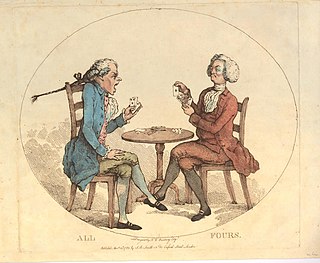
All fours is a traditional English card game, once popular in pubs and taverns as well as among the gentry, that flourished as a gambling game until the end of the 19th century. It is a trick-taking card game that was originally designed for two players, but developed variants for more players. According to Charles Cotton, the game originated in Kent, but spread to the whole of England and eventually abroad. It is the eponymous and earliest recorded game of a family that flourished most in 19th century North America and whose progeny include pitch, pedro and cinch, games that even competed with poker and euchre. Nowadays the original game is especially popular in Trinidad and Tobago, but regional variants have also survived in England. The game's "great mark of distinction" is that it gave the name 'jack' to the card previously known as the knave.
David Parlett is a games scholar, historian, and translator from South London, who has studied both card games and board games. He is the president of the British Skat Association.
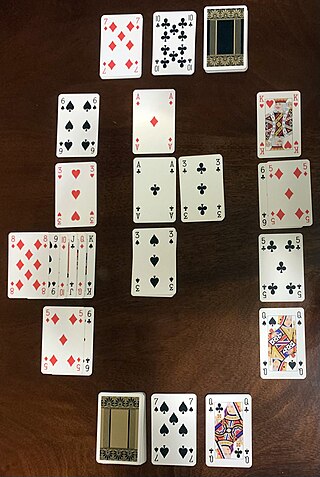
Russian bank, crapette or tunj, historically also called the wrangle, is a card game for two players from the patience family. It is played with two decks of 52 standard playing cards. The U.S. Playing Card Company, who first published its rules in 1898, called it "probably the best game for two players ever invented".

Nerts (US), or Racing Demon (UK), is a fast-paced multiplayer card game involving multiple decks of playing cards. It is often described as a competitive form of Patience or Solitaire. In the game, players or teams race to get rid of the cards in their "Nerts pile" by playing them in sequences from aces upwards, either into their personal area or in a communal central area. Each player or team uses their own deck of playing cards throughout the game.
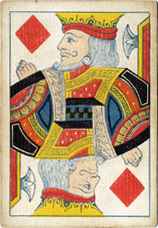
Ranter Go Round is a primitive, traditional, English gambling game and children's game using playing cards that also nowadays goes under the name of Chase the Ace.

Klaverjas or Klaverjassen is a Dutch four-player trick-taking card game that uses a Piquet pack of 32 playing cards. It is closely related to the game of Klaberjass and is one of the most popular card games in the Netherlands, traditionally played in cafes and social clubs. It offers a considerable level of complexity and depth. It has numerous variants, but its basic rules are universal.
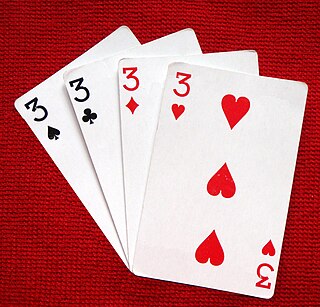
Put, occasionally Putt, is an English tavern game first recorded in the 16th century and later castigated by 17th century moralists as one of ill repute. It belongs to a very ancient family of trick-taking card games and bears close similarities a group known as Truc, Trut,Truque, also Tru, and the South American game Truco. Its more elaborate cousin is the Catelan and Spanish game of Truc, which is still much played in many parts of Southern France and Spain.

Klaberjass or Bela is a trick-taking ace–ten card game that is most popular in German communities. In its basic form it is a 9-card trick-and-draw game for two players using a 32-card piquet pack.

Trappola is an early 16th-century Venetian trick-taking card game which spread to most parts of Central Europe and survived, in various forms and under various names like Trapulka, Bulka and Hundertspiel until perhaps the middle of the 20th century. It was played with a special pack of Italian-suited cards and last reported to have been manufactured in Prague in 1944. Piatnik has reprinted their old Trappola deck for collectors.
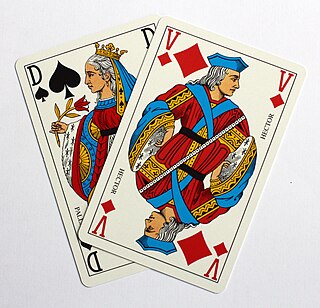
Marjolet is a French 6-card trick-and-draw game for two players using a 32-card piquet pack. It is of the Queen-Jack type, and thus a relative of Bezique and Pinochle, albeit simpler. The trump Jack is called the Marjolet from which the name of the game derives.

Rams is a European trick-taking card game related to Nap and Loo, and may be played by any number of persons not exceeding nine, although five or seven make a good game. In Belgium and France, the game of Rams is also spelt Rammes or Rems, in Germany, Rams, Rammes, Ramsch, Ramschen, Ramscheln or Ramsen, in Austria, Ramsen and Ramschen, and, in America, Rounce. The basic idea is fairly constant, but scoring systems vary. It was a widespread European gambling and drinking game that is still popular today. During the 19th century, it was introduced as Rounce in America and played with a 52-card deck without any difference between simples and doubles and with no General Rounce announcement. In the modern German variety of the game, Ramscheln, the 7♦ is the second best trump ranking next below the ace.
Ristikontra or ristiklappi, sometimes translated as cross-clap, is a Finnish point-trick game for four players using a standard 52-card pack. Card suits do not play a role in this game, and there is no ranking order. A trick is won by the last player to play a card of the same rank as the card led.

In card games, a talon is a stack of undealt cards that is placed on the table to be used during the game. Depending on the game or region, they may also be referred to as the blind, kitty, skat, stock, tapp or widow (US).

An ace–ten game is a type of card game, highly popular in Europe, in which the aces and tens are of particularly high value.
John McLeod is a British mathematician, author, historian and card game researcher who is particularly well known for his work on tarot games as well as his reference website pagat.com which contains the rules for over 500 card games worldwide. He is described as a "prominent member" of the International Playing Card Society and is Secretary of the British Skat Association.
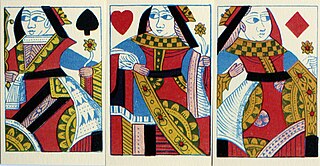
Laugh and lie down or laugh and lay down is an historical English card game for five players and the earliest example of a European game of the fishing family.
Cucumber is a north European card game of Swedish origin for two or more players. The goal of the game is to avoid taking the last trick. David Parlett describes it as a "delightful Baltic gambling game".
References
- Parlett, David (2004). A-Z of Card Games'. Oxford: Oxford University Press. ISBN 978-0198608707.
- Parlett, David (2006). Teach Yourself Card Games, 4th edn. McGraw-Hill. ISBN 978-0340927281.
- Parlett, David (2008). The Penguin Book of Card Games. London: Penguin. ISBN 978-0-141-03787-5.